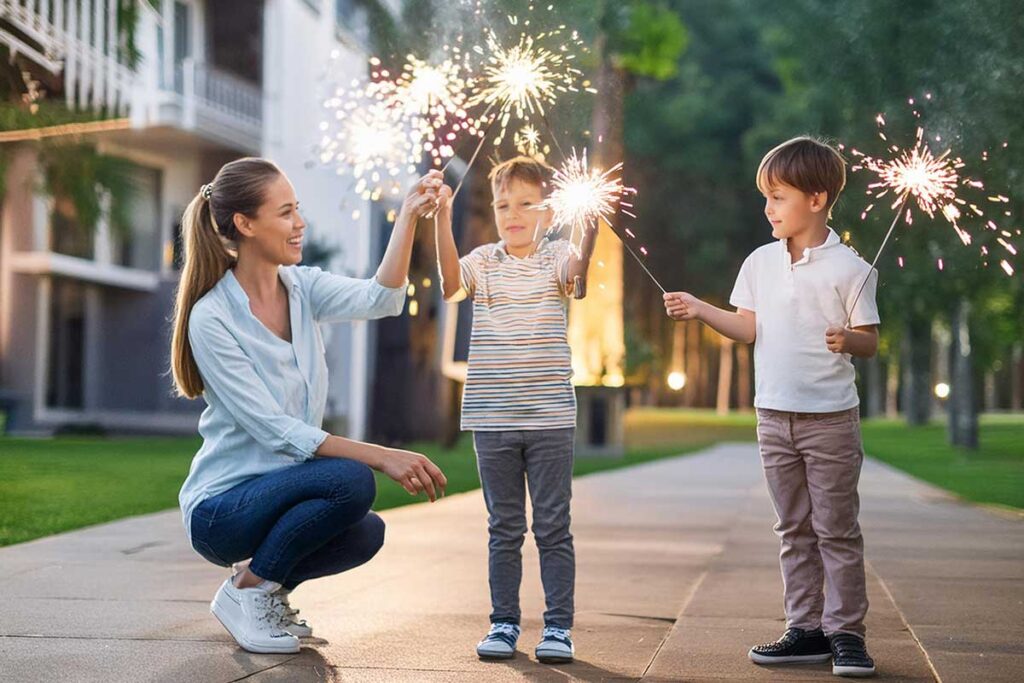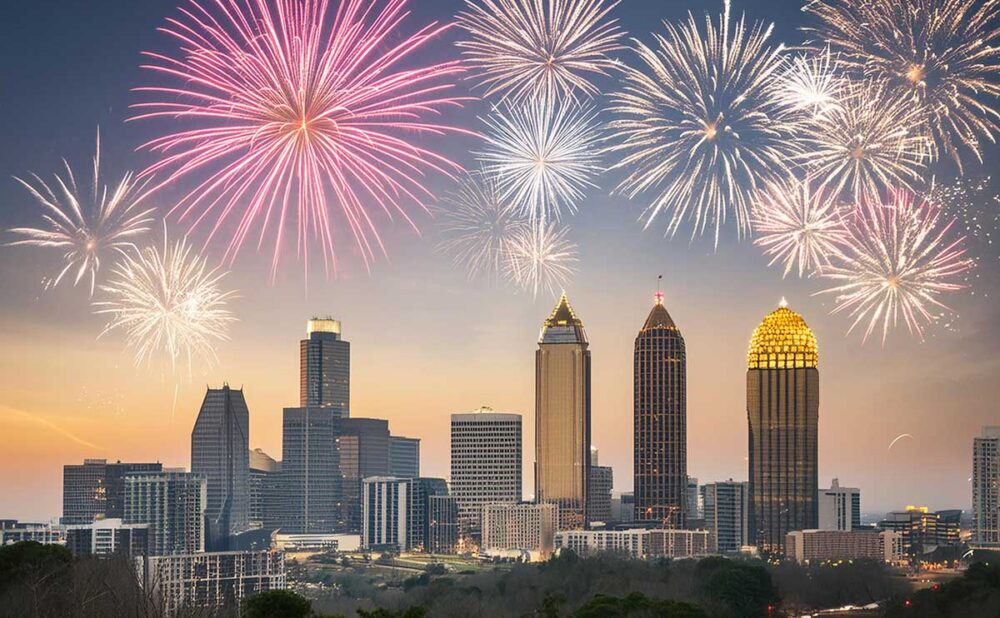Georgia’s Fireworks Laws: Staying Safe with Fireworks
As the 4th of July approaches, many Georgians are gearing up to celebrate with fireworks. While the excitement is palpable, it’s crucial to understand and adhere to Georgia’s fireworks laws to ensure a safe and enjoyable experience for all.
The American Pyrotechnics Association (APA) has been at the forefront of the fireworks industry for more than seventy years, advocating for safety in the creation and utilization of legal fireworks. The APA promotes responsible regulation of the fireworks industry. Its members are dedicated to upholding safety standards and adhering to regulations.
Let’s delve into the essential information you need to know to stay legal and stay safe this holiday season.
Fascinating Fireworks Facts (from Georgia.gov )
Fireworks have long been a symbol of celebration and joy in American culture, dating back to the historic 1777 4th of July festivities. While today we associate fireworks with the patriotic colors of red, white, and blue, it may surprise many to learn that in the early days, these dazzling displays only came in one color – orange.
In Georgia, a 5% sales tax on fireworks contributes to funding the state’s trauma care network and supports the training and equipment needs of firefighters across the state. This initiative helps ensure that emergency services are well-equipped to respond to any incidents that may occur during firework celebrations.
Despite the excitement that fireworks bring, it is essential to remember that they pose significant risks, especially to younger individuals. Statistics show that children in the 0-4 age group are particularly vulnerable to firework-related injuries, followed by those aged 10-14. Surprisingly, sparklers, often considered harmless, can reach temperatures as high as 2,000° F and are responsible for a significant portion of injuries among children under 5 years old.
When it comes to the global fireworks industry, China reigns supreme as the largest manufacturer and exporter of fireworks worldwide, supplying a staggering 90% of all fireworks. This highlights the significant role that China plays in bringing the magic of fireworks to celebrations around the globe.
As we revel in the beauty and wonder of fireworks displays, let us also keep in mind the importance of safety and responsible usage to ensure that these dazzling spectacles continue to bring joy to generations to come.
What Types of Fireworks Can You Buy in Georgia?
In the state of Georgia, the purchase and use of consumer fireworks classified as DOT 1.4G are permitted under the regulations outlined in the Georgia General Assembly House Bill 727. Fireworks available for sale in various retail stores throughout Georgia include:
- Bottle Rockets
- Sky Rockets
- Roman Candles
- Firecrackers
- Sparklers
- Smoke and Punk
- Fountains
- Missiles
- Novelties
- Crackle and Strobe
- Parachutes
- Wheels and Spinners
- Sky Flyers
- Display Shells
- Aerial Items (Cakes)
It’s important to note that not all fireworks are legal, so be sure to familiarize yourself with the approved types before making a purchase.
Who Can Buy Consumer Fireworks in Georgia?
To purchase fireworks in Georgia, you must be 18 years or older. While there isn’t a specific age requirement for igniting fireworks, it’s crucial to exercise caution, especially with children under 16 who are at a higher risk of injuries. Remember, it is illegal to handle fireworks while under the influence of drugs or alcohol.
Rule 120-3-22-.12 – Purchase of Consumer Fireworks
When Can You Light Fireworks in Georgia?
In Georgia, fireworks are only permitted at certain times. Fireworks can be legally used any day between 10 a.m. and 11:59 p.m.
Regardless of local legislation, the use of fireworks is legal until 11:59 p.m. statewide around certain holidays:
- Memorial Day (last Saturday and Sunday in May)
- Independence Day (July 3 and 4)
- Labor Day (first Monday in September)
- New Year’s Eve (December 31, extended to 1 a.m. on January 1)
Georgia Law Pertaining to Fireworks: Rule 120-3-22-.13 Use of Fireworks
Note: New legislation effective July 1, 2018, allows local authorities the option to limit the use of fireworks during specific periods, as long as this limitation is part of a general noise ordinance that does not apply solely to fireworks.

Where Can You Light Fireworks in Georgia?
Fireworks have long been a staple in celebrations, adding color and excitement to various events. However, it’s essential to understand the regulations and safety precautions associated with fireworks to ensure a fun and accident-free experience for everyone involved.
The legality of lighting fireworks varies depending on your location. Private communities such as HOAs, condos, or apartment complexes may have specific rules regarding fireworks, so it’s essential to check with your community guidelines before igniting fireworks. In many public spaces, fireworks are prohibited unless authorized by a special license (under Exception 2 as provided for in O.C.G.A. § 25-10-2(a)(3)(D)).
It is also illegal to ignite fireworks while under the influence of alcohol or drugs. Additionally, obtaining a permit from the local governing agency is necessary for any public displays or exhibitions of fireworks.
Places Where Fireworks are Illegal
Additionally, it is illegal to light fireworks within 100 yards of certain facilities like:
- Electric plant
- Water treatment plant
- Waste-water treatment plant
- Gas station
- Refinery
- Electric substation
- Jail or prison
- Helipad
- Hospital
- Nursing home
- Other health care facility
Furthermore, in Georgia, Governor Brian Kemp holds the authority to restrict the use of fireworks in areas experiencing drought conditions, emphasizing the importance of fire safety and environmental protection.
Fireworks are not allowed in Georgia state parks as per the regulations set by the Georgia Department of Natural Resources, State Parks and Historic Sites. The use of fireworks is also prohibited in all other public parks unless a special license has been obtained. It is important to note that setting off fireworks while under the influence of alcohol or drugs is strictly against the law.
Rule 120-3-22-.14 – Unlawful Activity
While consumer fireworks are legal in Georgia, they are classified as hazardous materials (hazmat) division 1.4G explosives and should be handled with care. It is crucial to adhere to laws and guidelines when purchasing and lighting fireworks to prevent accidents and injuries.
As you prepare to celebrate with fireworks in Georgia, remember that safety should always be a top priority. By understanding and following the state’s fireworks laws, you can ensure a festive and injury-free holiday season for you and your loved ones. Enjoy the celebrations responsibly, and have a happy and safe 4th of July!
Consumer fireworks may be used, ignited, or caused to be ignited on any day between the hours of 10:00 A.M. and 11:59 P.M. unless during such times the noise from such use or ignition is not in compliance with a noise ordinance of a county or municipal corporation.
Safety Reminders and Tips
Consumer fireworks were officially legalized in Georgia on July 1, 2015. Safety should always be a top priority when using fireworks. Consumer fireworks, including firecrackers, sparklers, and skyrockets, should be used responsibly in accordance with guidelines from the United States Consumer Product Safety Commission (CPSC). The 2023 Fireworks Annual Report underscores the dangers associated with the use of fireworks by consumers. CPSC is working to educate the public and provide safety recommendations in order to reduce the number of injuries and fatalities during the holiday season.
In addition, statistics show that a significant percentage of fireworks-related injuries occur during the Independence Day period, with children under 5 years old being particularly vulnerable to sparkler burns. It is crucial to supervise young children around fireworks and ensure proper safety measures are in place. On the actual Fourth of July, fireworks are responsible for igniting more fires across the country than any other cause combined. Annually, around 7,000 individuals seek medical treatment in hospital emergency rooms due to injuries caused by fireworks, with a majority of these incidents involving children.
While fireworks add excitement to celebrations, it is crucial to prioritize safety, follow regulations, and exercise caution when handling these explosive materials. By being informed and responsible, you can enjoy fireworks displays while protecting the well-being of yourself and those around you.
Fireworks Safety Precautions for a Fun and Safe Celebration
Fireworks are a popular way to celebrate special occasions, but it’s crucial to prioritize safety to prevent accidents and injuries. From 2006-2021, firework-related injuries have seen a concerning 25% rise, with approximately 11,500 individuals sustaining injuries and at least 9 fatalities reported in 2021 alone. A majority of these incidents occur during Fourth of July celebrations. In light of these risks, Georgia Insurance and Safety Fire Commissioner John F. King offers some essential safety tips to keep in mind when using legal fireworks:
- Always read and follow label directions to ensure proper usage.
- Use fireworks outdoors in a clear, open area away from structures and flammable materials.
- Avoid experimenting with or creating homemade fireworks as they can be extremely dangerous.
- Light only one firework at a time and maintain a safe distance after lighting it.
- Never attempt to re-ignite malfunctioning fireworks; instead, douse them with water.
- Always have a responsible adult present to supervise the use of fireworks.
- Keep fireworks out of reach of small children and never allow them to handle or light fireworks.
- Have a water source nearby, such as a bucket or garden hose, in case of emergencies.
- Do not throw fireworks at others or aim them in their direction.
- In case of any accidents or emergencies, immediately contact your local 911 services for assistance.
Fire Works Safety Tips from the NFPA
By adhering to these safety guidelines and precautions, you can enjoy a festive fireworks display while prioritizing the well-being of yourself and those around you. Remember, safety always comes first when celebrating with fireworks.

GEORGIA PERSONAL INJURY LAWYER NEAR ME
Fireworks Safety: Protecting Yourself and Others
Fireworks are a staple of celebrations and special occasions, but it’s crucial to prioritize safety to prevent potential injuries. Negligence when handling fireworks can lead to severe consequences, both physically and legally.
In the event of a fireworks-related injury, seeking legal guidance from a personal injury lawyer can help determine liability and explore options for financial recovery. Prioritizing safety and responsible firework handling is key to enjoying these dazzling displays while minimizing the risk of accidents and injuries. Stay informed, stay safe, and make every celebration a memorable and secure one.
Who is Liable for Fireworks Accidents?
In the event of a fireworks injury, the injured party (the plaintiff) may have grounds for a personal injury claim against the responsible party or parties (the defendant(s)). Liability in fireworks incidents typically falls on either the individual handling the fireworks or the manufacturer, designer, or distributor of the fireworks.
If someone is injured by fireworks due to another person’s actions, they may pursue a negligence claim against the responsible party. Anyone using fireworks must exercise a reasonable standard of care, and failure to do so can result in liability for any resulting injuries. Additionally, using illegal fireworks can automatically lead to liability.
In cases where the injury is caused by a malfunctioning firework, the injured party may file a product liability claim against the responsible entity. Understanding the risks associated with fireworks and knowing who may be held liable in the event of an accident is crucial to ensuring safety during celebrations involving fireworks.
Understanding Legal Options in Firework-Related Injuries
Fireworks are synonymous with celebrations and joyous occasions, but the explosive nature of these dazzling displays can sometimes lead to accidents and injuries. If you find yourself injured due to fireworks, it’s crucial to understand your legal rights and potential avenues for seeking compensation.
In the unfortunate event of a fireworks-related injury, the injured party may have grounds for a personal injury claim against the liable party. Determining liability in such cases depends on the specific circumstances surrounding the injury. Generally, liability can be attributed to either the individual handling the fireworks or the manufacturer, designer, or distributor of the fireworks that caused harm.
Victims of firework accidents may seek various legal remedies to address their losses. These remedies often involve monetary compensation to cover expenses such as:
- Medical bills
- Property damage
- Prescription costs
- Lost wages
Illegal Fireworks and Other Negligent Factors
For injuries caused by another person setting off fireworks, the injured party may pursue a personal injury claim based on negligence. In cases where an individual’s reckless actions lead to a firework-related injury, criminal charges for recklessness may apply. Moreover, penalties can escalate if the fireworks were illegally possessed or used. Fireworks are inherently hazardous, and those using them are expected to exercise reasonable care. Failure to do so could render the responsible party liable for resulting injuries, particularly if illegal fireworks were involved.
In cases where the injury is directly linked to as defective firework or fireworks display, the injured individual may consider a product liability claim against the relevant party. This legal route involves asserting that a flaw in the product led to the injury, potentially holding manufacturers or display organizers accountable.
Navigating the legal complexities of fireworks injury claims can be challenging, given the inherent risks associated with fireworks. Demonstrating that an injury resulted from an unforeseen danger or inadequate warnings adds another layer of complexity to such cases.
Should I Hire a Lawyer for Assistance with a Fireworks Accident Claim?
If you’ve sustained injuries from a fireworks accident and are contemplating legal action, consulting with a seasoned personal injury attorney can be beneficial. A knowledgeable lawyer can navigate the complex landscape of personal injury and fireworks laws in Georgia. They can assist in establishing liability, initiating a personal injury claim, and representing your interests in legal proceedings, if necessary. The Jewkes Firm is here to guide you through the next steps. Contact us today at (770) 771-5130 or fill out the form for a FREE consultation.




